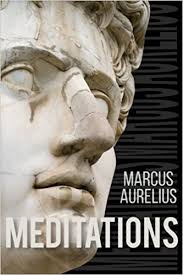Meditations Page #4
Meditations is a series of personal writings by Marcus Aurelius, Roman Emperor from 161 to 180 AD, recording his private notes to himself and ideas on Stoic philosophy. Marcus Aurelius wrote the 12 books of the Meditations in Koine Greek as a source for his own guidance and self-improvement.
Genre: Non-Fiction
Genre: Non-Fiction
- Year:
- 161
- 942 Views
This dictum might easily be taken to mean that virtue consists in yielding to each natural impulse; but that was very far from the Stoic meaning. In order to live in accord with nature, it is necessary to know what nature is; and to this end a threefold division of philosophy is made--into Physics, dealing with the universe and its laws, the problems of divine government and teleology; Logic, which trains the mind to discern true from false; and Ethics, which applies the knowledge thus gained and tested to practical life. The Stoic system of physics was materialism with an infusion of pantheism. In contradiction to Plato's view that the Ideas, or Prototypes, of phenomena alone really exist, the Stoics held that material objects alone existed; but immanent in the material universe was a spiritual force which acted through them, manifesting itself under many forms, as fire, aether, spirit, soul, reason, the ruling principle. The universe, then, is God, of whom the popular gods are manifestations; while legends and myths are allegorical. The soul of man is thus an emanation from the godhead, into whom it will eventually be re-absorbed. The divine ruling principle makes all things work together for good, but for the good of the whole. The highest good of man is consciously to work with God for the common good, and this is the sense in which the Stoic tried to live in accord with nature. In the individual it is virtue alone which enables him to do this; as Providence rules the universe, so virtue in the soul must rule man. In Logic, the Stoic system is noteworthy for their theory as to the test of truth, the Criterion. They compared the new-born soul to a sheet of paper ready for writing. Upon this the senses write their impressions, fantasias and by experience of a number of these the soul unconsciously conceives general notions koinai eunoiai or anticipations. prolhyeis When the impression was such as to be irresistible it was called (katalnptikh fantasia) one that holds fast, or as they explained it, one proceeding from truth. Ideas and inferences artificially produced by deduction or the like were tested by this 'holding perception.' Of the Ethical application I have already spoken. The highest good was the virtuous life. Virtue alone is happiness, and vice is unhappiness. Carrying this theory to its extreme, the Stoic said that there could be no gradations between virtue and vice, though of course each has its special manifestations. Moreover, nothing is good but virtue, and nothing but vice is bad. Those outside things which are commonly called good or bad, such as health and sickness, wealth and poverty, pleasure and pain, are to him indifferent adiofora. All these things are merely the sphere in which virtue may act. The ideal Wise Man is sufficient unto himself in all things, autarkhs and knowing these truths, he will be happy even when stretched upon the rack. It is probable that no Stoic claimed for himself that he was this Wise Man, but that each strove after it as an ideal much as the Christian strives after a likeness to Christ. The exaggeration in this statement was, however, so obvious, that the later Stoics were driven to make a further subdivision of things indifferent into what is preferable (prohgmena) and what is undesirable. They also held that for him who had not attained to the perfect wisdom, certain actions were proper. (kaqhkonta) These were neither virtuous nor vicious, but, like the indifferent things, held a middle place. Two points in the Stoic system deserve special mention. One is a careful distinction between things which are in our power and things which are not. Desire and dislike, opinion and affection, are within the power of the will; whereas health, wealth, honour, and other such are generally not so. The Stoic was called upon to control his desires and affections, and to guide his opinion; to bring his whole being under the sway of the will or leading principle, just as the universe is guided and governed by divine Providence. This is a special application of the favourite Greek virtue of moderation, (swfrosuum) and has also its parallel in Christian ethics. The second point is a strong insistence on the unity of the universe, and on man's duty as part of a great whole. Public spirit was the most splendid political virtue of the ancient world, and it is here made cosmopolitan. It is again instructive to note that Christian sages insisted on the same thing. Christians are taught that they are members of a worldwide brotherhood, where is neither Greek nor Hebrew, bond nor free and that they live their lives as fellow-workers with God.
Translation
Translate and read this book in other languages:
Select another language:
- - Select -
- 简体中文 (Chinese - Simplified)
- 繁體中文 (Chinese - Traditional)
- Español (Spanish)
- Esperanto (Esperanto)
- 日本語 (Japanese)
- Português (Portuguese)
- Deutsch (German)
- العربية (Arabic)
- Français (French)
- Русский (Russian)
- ಕನ್ನಡ (Kannada)
- 한국어 (Korean)
- עברית (Hebrew)
- Gaeilge (Irish)
- Українська (Ukrainian)
- اردو (Urdu)
- Magyar (Hungarian)
- मानक हिन्दी (Hindi)
- Indonesia (Indonesian)
- Italiano (Italian)
- தமிழ் (Tamil)
- Türkçe (Turkish)
- తెలుగు (Telugu)
- ภาษาไทย (Thai)
- Tiếng Việt (Vietnamese)
- Čeština (Czech)
- Polski (Polish)
- Bahasa Indonesia (Indonesian)
- Românește (Romanian)
- Nederlands (Dutch)
- Ελληνικά (Greek)
- Latinum (Latin)
- Svenska (Swedish)
- Dansk (Danish)
- Suomi (Finnish)
- فارسی (Persian)
- ייִדיש (Yiddish)
- հայերեն (Armenian)
- Norsk (Norwegian)
- English (English)
Citation
Use the citation below to add this book to your bibliography:
Style:MLAChicagoAPA
"Meditations Books." Literature.com. STANDS4 LLC, 2024. Web. 18 May 2024. <https://www.literature.com/book/meditations_76>.




Discuss this Meditations book with the community:
Report Comment
We're doing our best to make sure our content is useful, accurate and safe.
If by any chance you spot an inappropriate comment while navigating through our website please use this form to let us know, and we'll take care of it shortly.
Attachment
You need to be logged in to favorite.
Log In